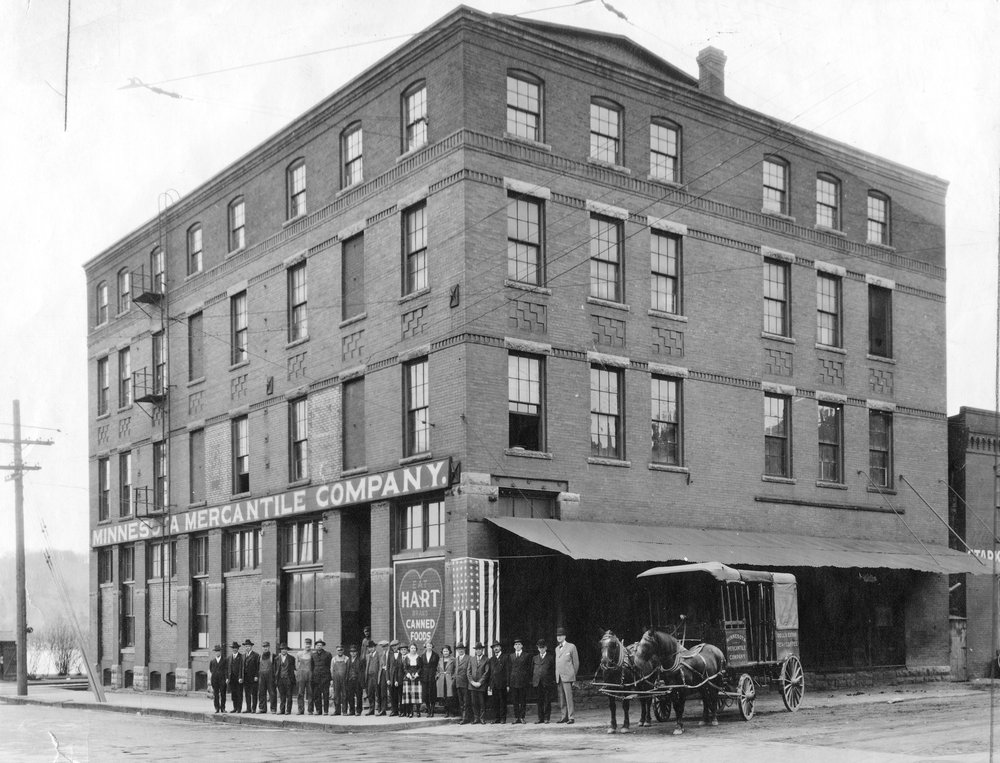Minnesota Mercantile Company
Wholesale grocery stores are nothing new. In the late 19th century Stillwater had its share of the wholesale mercantile market that sold everything from produce to spices and more. These companies were sell to the neighborhood grocer then eventually end up in every kitchen in Stillwater. The Minnesota Mercantile was the leader in wholesale grocers in the community for over 80 years.
The Minnesota Mercantile got its start with Joseph Schupp & Sons. Schupp was born in Germany and arrived in Stillwater in 1858. He started in the dry goods business with only $400 worth of goods. His persistence in the business eventually led him into the wholesale grocery market. By the early 1880s he was doing about $60,000 worth of business annually.
In 1884, Albert G. Triebel, of Peoria, Ill, became a partner with Schupp. Four years later, in 1888, Triebel and others reorganized the business into the Minnesota Mercantile Company. The incorporation papers were filed on March 1, 1888, the organizers were James S. O’Brien, Fred Pennington, John Freeman, Albert Triebel, and N. Clapp. At that time the capital stock was set at $50,000 and Triebel was the original manager of the company and O’Brien the president of the company.
The company sold merchandise to the lumber camps and operated its wholesale and retail store in Stillwater. It served western Wisconsin interests and went far into western Minnesota. Shipments were made by rail at first, but later they were also made by truck.
At first the new company used the old Schupp building on South Main Street. Around 1899 they built a large, four story building at 401-411 East Chestnut Street. The building was fitted with every convenience necessary for the rapid handling of business and O.H. Olson of Stillwater was the contractor. In 1902, the Minnesota Mercantile passed the half million mark in sales and continued to increase.
The Mercantile developed their own lines of spices and baking goods. The most recognizable name was the “Dells” Brand, but the company also produced “Eclipse” vanilla, “State” brand molasses, along with the “Crescent” and “Ten Cent” brands.
After James S. O’Brien served as the company’s president, Albert Triebel took over in 1904. He remained president and general manager until his death in 1915. Harry K. Huntoon then became president of the Mercantile and served until his death in 1935. Huntoon also served as the president of the Minnesota Wholesale Grocers Association and was a member of the executive committee of the National Wholesale Grocers Association until his death.
Columnist Larry Ho of the St. Paul Dispatch wrote of Huntoon, “His high idealism as a business man made him respected everywhere. He never wanted ‘success’ or ‘profit’ at the cost of sacrificing his high principles of conduct.”
In 1941 the officers of the Company were Frank J. Schaffer, President; Alex M. Deragisch, Vice President; and James Mulvey, Secretary and Treasurer. Other directors included Robert E. Slaughter; William Bean, Daniel McCuish and A.J. Mulvey.
The Minnesota Mercantile Company did not last forever. On November 1, 1969, after serving the area for over 80 years, the business was liquidated. At the time of liquidation the president was James Mulvey. Other staffers consisted of Warren Kerr, Frank Schaffer Jr., Al Kroon, Karl Neumeier, Al Kreimer Sr., Joe Kreimer, Evelyn Peterson, Lenore Garey Rose Dreschler and Judy Jahnke. Salesmen were: Al Deragisch, Robert Slater, Henry Wolff, Frank Lindblom, George Barker Sr., Gordon Kelson, and William Peters.
The property was sold to the city of Stillwater and the city then demolished the building and created a public parking lot on the site.
—Brent Peterson
Brent Peterson is Executive Director of the Washington County Historical Society

